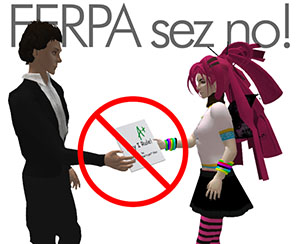
While much of The College Fix‘s legal coverage has focused on colleges denying due process to students accused of sexual assault, we’re also on the lookout for schools’ mischievous (or just ignorant) misuses of student privacy law – to hide their own misdeeds or avoid embarrassment.
Courtesy of the Student Press Law Center’s FERPA Fact project, we hear about an unusual case that melds these two issues – Title IX and the Family Educational Rights and Privacy Act (FERPA).
The College of the Desert in California refused to confirm whether it had expelled a student, Jesse Timothy Lara, who was later convicted – in court, not public opinion – of sexual battery against two fellow students. Lara was just released on parole after a year because of “credits for time served” and now must register as a sex offender.
KMIR News reports:
When asked today if Lara was expelled and when, COD issued a statement saying the college “is unable to confirm any information regarding this case. COD has not been cooperative releasing information to KMIR News about this case. All of our student’s privacy rights continue to be protected by FERPA (Family Educational Rights and Privacy Act).”
How thoughtful of the school. Except it said a year ago, when police first spoke to the victims, that the attacks involved “unwanted touching” and the college was “moving forward to have the student expelled,” according to KMIR.
FERPA Fact says:
If there was any actual FERPA violation here, it occurred when the College put out a statement following Lara’s arrest announcing its intention to expel him. Somehow, the College has convinced itself that announcing plans to expel someone doesn’t violate privacy, but announcing the outcome does. Really, guys? If you’re going to be ignorant, at least have the redeeming virtue of consistency.
FERPA Fact gives a couple different scenarios for how the school could have reacted to Lara’s attacks and whether FERPA would have applied. The first is
College of the Desert did take disciplinary action against Lara. If so, then that outcome plainly is unprotected by FERPA confidentiality … [quoting statute] ‘Nothing in this section shall be construed to prohibit an institution of postsecondary education from disclosing the final results of any disciplinary proceeding conducted by such institution against a student who is an alleged perpetrator of any crime of violence …'”
The other is
the College didn’t bother expelling Lara, perhaps believing it lacked jurisdiction over him once he was enrolled in a different institution [jail] … But that — not “student privacy” — is what the College should (and legally could) have said: “We only discipline people if they’re enrolled, and after they leave, we can’t ‘expel’ them anymore.”
The misuse of both FERPA and Title IX have a common source: poor federal guidance. SPLC says:
In the absence of clear guidance from the Department of Education, schools are using FERPA to restrict access to public records. … Open government advocates have repeatedly asked the Department of Education to clarify what records FERPA protects, but the law hasn’t gotten any clearer.
Going in the other direction, the Department of Education has interpreted Title IX to mean that “gender justice” requires a low standard for guilt, as Christina Hoff Sommers of the American Enterprise Institute noted when the guidance came out three years ago:
How did Ali and her fellow lawyers in the Department of Education manage to find in the Title IX gender-equity statute grounds for demanding colleges to adopt a “preponderance of evidence” standard? That is a mystery. Hans Bader, a former Education Department lawyer, says that nothing in Title IX justifies taking away an accused person’s right to a firm presumption of innocence, requiring clear and convincing evidence. Ali and her colleagues, he suggests, are “legislating through administrative fiat, in a way that is arbitrary and capricious.” And dangerous, one might add.
It would be nice if the Department of Education’s enlightened leaders could actually apply the relevant statutes neutrally, rather than telling schools how to get off the hook and punish someone else.
Greg Piper is an assistant editor of The College Fix. (@GregPiper)
Like The College Fix on Facebook / Follow us on Twitter
IMAGE: iliveisl/Flickr






Please join the conversation about our stories on Facebook, Twitter, Instagram, Reddit, MeWe, Rumble, Gab, Minds and Gettr.